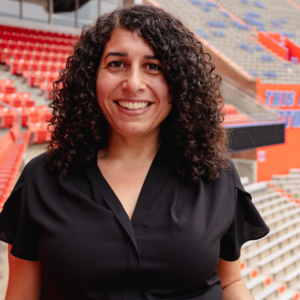Research Spotlight: Zandra de Araujo
Q & A with Zandra de Araujo, Ph.D., Chief Equity Officer and Mathematics Principal in the Lastinger Center for Learning
What research are you currently working on?
My current research focuses on teacher professional development and equitable mathematics instruction. I currently have two large research grants I am working on. I am the principal investigator of the Practice-Driven Professional Development (PDPD) Project (NSF #2206774, $2,533,289). The PDPD Project researches and develops professional development aimed to help teachers enact incremental changes to their existing instruction in algebra.
On the second project, led by Dr. Hyunyi Jung, I am a co-principal investigator. The project, Empowering Students with Choice through Equitable and Interactive Mathematical Modeling (EIM2, NSF #2200928, $1,978,280), helps students engage in equitable mathematical modeling. Equitable mathematical modeling is the process of using mathematics to analyze and quantify scenarios through a lens of equity and studying the outcomes of that process.
In addition to these two funded projects, I continue to study teachers’ instruction in mathematics with students classified as English learners.
What is the broader impact of your research?
My research aims to develop and study practical solutions for teachers that center the constraints and realities of teachers’ contexts. This is critical if we are to create scalable and sustainable solutions to persistent challenges teachers face. In terms of mathematics, my work centers on algebra, a subject that has been identified as a gatekeeper (Moses & Cobb, 2001) to students’ future opportunities in school and beyond. By improving the teaching and learning of algebra, we can ensure students’ opportunities are not narrowed upon leaving the algebra classroom.
What other research topics are you interested in?
I am interested in the use of technology to support teacher and student learning more broadly. In particular, I have interest in how technology can help facilitate differentiation learning for students in the classroom in alignment with high-leverage instructional practices (e.g., facilitating discourse, the use of multiple representation, etc.). I am interested in understanding how technology can provide personalized learning pathways to enhance their knowledge and skills for teaching mathematics.










